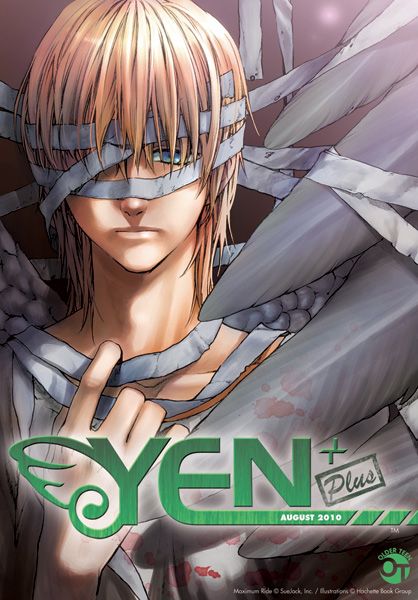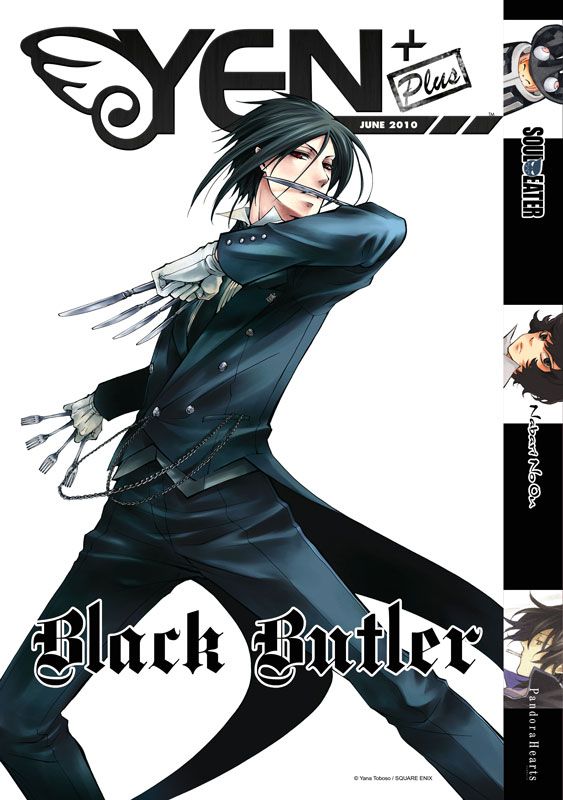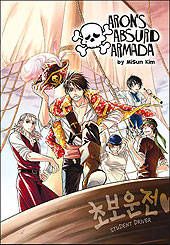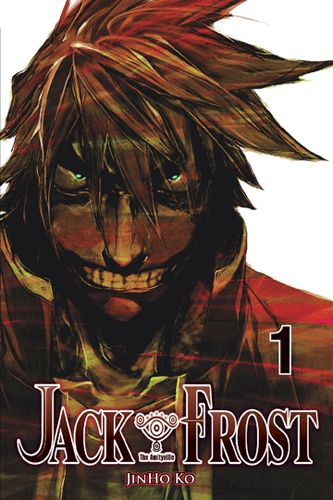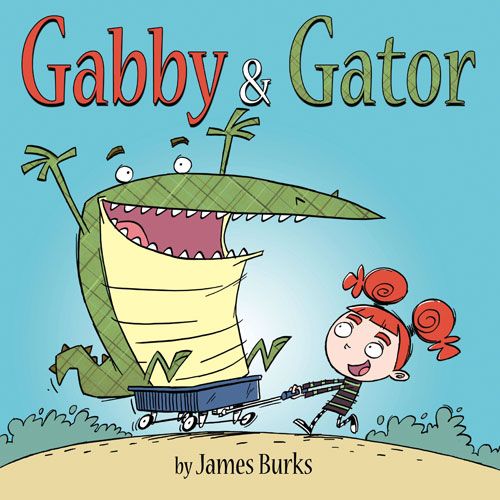Yen Press editorial director Kurt Hassler unveiled the online version of Yen Plus magazine at Comic-Con last month, and it has given people plenty of fodder for discussion. The magazine is available in all regions (unlike other online manga sites, which are often limited to North America), and it will cost $2.99 per month, although Yen is offering a free online trial through September 9. What's up at the moment is a mixed bag of old and new, Korean and original English-language manga—but no Japanese titles, although Hassler has hinted broadly that the all-ages favorite Yotsuba&! will be included in the mix in future.
Coincidentally (or perhaps not), the Japanese series Black Butler, Nabari no Ou, and Pandora Hearts, which had been serialized in the print edition of Yen Plus, are now up on a new online manga site from Square Enix, the Japanese publisher of those series. That site is also in a free-sample mode right now, with an online store projected to open in the fall. Hassler would not comment on the relationship between the two, but the Square Enix site is currently hosting the Yen Press editions of these manga.
I spoke to Kurt about the new Yen Plus, the recent removal of all the online manga from OneManga.com, and Yen's new line of children's books.
Brigid Alverson: How will the paid version of Yen Plus differ from the free version we have been reading?
Kurt Hassler: It's really not going to be different. The experience you have now will be pretty much the same. The only different element will be the PayPal component for getting your subscription.
Brigid: What about the Japanese content?
Kurt: That is something we are working on. We have the first title, but finalizing the contract is always getting down to the wire. It is not going to be a ton of material initially; you are going to see material being added gradually over time as licensors get comfortable with digital distribution.
Brigid: Are Japanese licensors still wary of online manga?
Kurt: It's very new. It's something they have been resistant to, and it's new for everybody. Digital content is a new area for everyone and it is evolving very, very rapidly. I think it has reached a point where licensors in Japan are at least open to discussing it, but because it is so new and it's something they haven't done before, they are trepidatious about it—and understandably, to some degree.
Brigid: The Japanese titles you had in the print magazine are no longer there?
Kurt: They are not there.
Brigid: But they are on the Square Enix site?
Kurt: They are not being serialized on Square Enix—I cannot talk about the Square Enix thing. There are ongoing conversations, so it's a "no comment," unfortunately. We are supplying materials for it, but I really can't say anything more than that right now.
Brigid: So Black Butler is not coming back?
Kurt: I can't say.
Brigid: One of the things Deb Aoki pointed out about Yen Plus is that it is not region-blocked—people can read it anywhere. Why did you decide to do that, and how hard was it to negotiate the licenses?
Kurt: It's about raising the profile as much as we can. The thing about digital is there are going to be work-arounds, people are going to try to pirate material, and we felt, we know there is demand in other territories for this material so we really wanted to make the push to make it available.
Brigid: Is this the reason there are no Japanese series?
Kurt: No, it's not really that. It all goes back to the digital trepidation, but territory control is something licensors are very focused on, I don't think we really understand the concerns in Japan about the territory restrictions. It's not that they are shortsighted. They do realize there is demand in other territories—that's the point. They want to foster localization for particular territories, and if there is material in English going in there, it can undermine those efforts. It's something they do look at and they are very concerned about. They have seen this in other markets in print, where they are trying to build local markets for the material in the language, but then English language material ends up getting in there and it really undermines the effort.
Brigid: I get that, but that's not how the internet works.
Kurt: It's a changing world, and it's going to take time to change with it. Everybody seems to want these things to change overnight, but that's not going to happen. As much as we would like to go further down this path, we are not pirates. We cannot do what we want irregardless of the feelings of the people creating this material.
Brigid: Speaking of pirates, OneManga.com is now down. [Yen Press is a member of a coalition of publishers that united to fight bootleg manga sites.] How did you do that?
Kurt: It's nice to see people being responsible about it. It's not that there was even a question that what they were doing was OK. I got a sense that the people running these sites think no one is paying any attention. Now people are paying attention. The sites that aren't going that route, they are very much on our radar, and there is a lot of liability associated with what they are doing.
Brigid: Still speaking of pirates, I know that Aarons Absurd Armada is web-only for now. Why is that?
Kurt: We are not going with web only for that. That will be in print.
Brigid: Oh, that must have been an internet rumor. Would you consider doing web-only series?
Kurt: We would consider it for the right books. We don't have any immediate plans for that because ultimately we want to drive attention to a property for the purposes of supporting the performance in print.
Brigid: The magazine is rated 17+, and the website actually prompts the user to state whether they are over 17. Why?
Kurt: The magazine was always rated for older teens. It's a recognition that there may be something that somebody might find objectionable. It's a callout.
It's not necessarily about reading levels. I think people misunderstand where the age ratings that come on books came from. They are not "This is the reading level for this book," it's really a callout to parents to give them a heads up that there may be content you might not find appropriate for someone this age. It's a service to parent to help them monitor what their kids are reading.
Brigid: So you are OK with kids under 17 reading the site?
Kurt: As long as their parents are. That's what it's there for.
Brigid: Some people, myself included, found the variety of material in the original magazine problematic—you had One Fine Day next to Jack Frost. I know this was a problem for librarians. Since this is fairly easy to do online, have you considered breaking up the magazine into different publications aimed at different groups of readers?
Kurt: Yes, if we get to that point. This is very experimental, just as the magazine was very experimental. We wanted to cast a wide net, and that's why there is such a diversity of content. If this works and it makes sense to begin segmenting by age rating, that is something we have definitely thought about.
Brigid: Will you continue to have extras, such as interviews and fan art, on the website?
Kurt: Fan art I believe was already in the first one, and we plan on continuing that. Where there are interview opportunities, we will do that. We want to maintain that magazine experience. That's why it's laid out the way it is—I wanted someone to continue the magazine experience rather than select individual chapters and possibly miss something else.
For our purposes this is still very much a marketing tool. This is something we call out new series with. That was to me one of the best things about having the magazine in print: You may be a fan of Maximum Ride, but you might find something else in there you like. It's that ability to introduce people to new things that they may not already be familiar with—that to me is one of the best marketing values of this whole proposition, and we wanted to maintain that rather than most sites, where you click on this and just read what you want. You have the ability to skip over chapters and navigate that way, but we want to encourage people to experience it as a magazine.
Brigid: Will there be any free content for readers who are hitting the site for the first time?
Kurt: It's something we are looking at. There is nothing planned immediately, but the purpose of this whole month is to leave it up there for a good long while to let people get a test run. There will be lists of the content, but there are no plans for a test run after this first month.
Brigid: I just received a copy of Gabby and Gator, and I know you have Goldilocks and the Seven Squat Bears by Émile Bravo as well. These seem to be flying under the radar a bit. Why did you choose to go in this direction, and how will you be promoting and marketing them?
Kurt: It's something we want to explore more of. We want to try more kids' material, and we have a few things in the pipeline. I wouldn't say it's a new direction, but it's something we are experimenting with.
It's a lot of library marketing. We are trying to get it positioned in different areas of bookstores. Gabby and Gator is a Junior Library Guild pick. We hear the demand from librarians and educators for graphic novels to use as a rezding tool. It's pursuing that path more than getting to our core manga fans.
Brigid: I suppose that being part of Hachette, you can get it into bookstores easily?
Kurt: It's a challenge, because it is a new area: Should it go to a middle grade buyer? The kids' graphic novel section? Picture books? It gets hard to categorize in a lot of ways, and there are political jostlings about where it should go, and buyers get territorial—if you say "graphic novels," there is a whole category for that, so does everything go there even if it's not necessarily the intended audience? It's not easy, but when you do get the support, that is gratifying.


